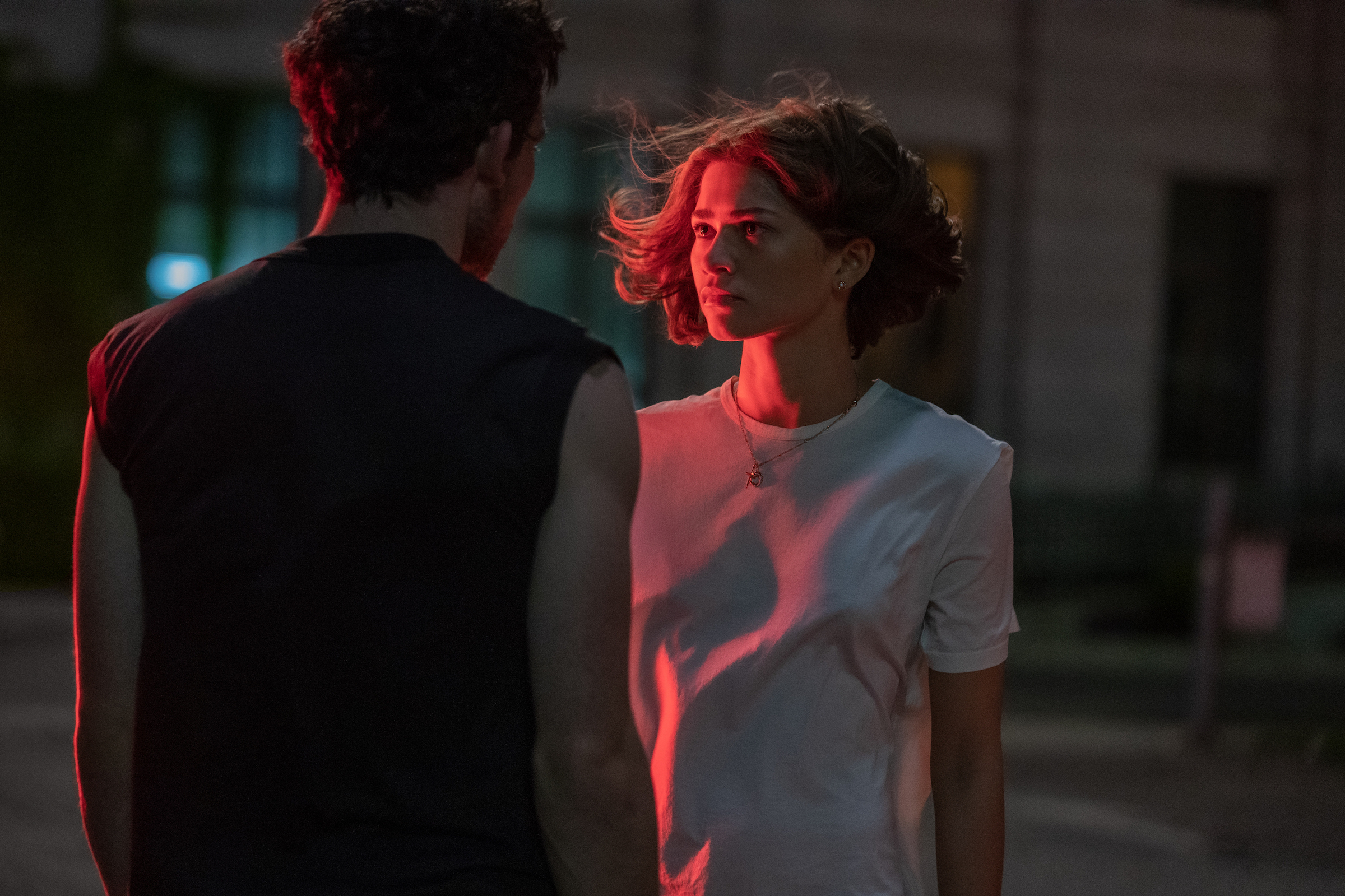The strapping grandeur of Myron’s Discobolus notwithstanding, it’s weirdly taboo to acknowledge the sensual appeal of athletes. Somehow we’re not supposed to notice the sassy-tight buns of football players in their tiny stretch pants, or the easy bedroom drawl of a basketball player's limbs. The message seems to be, Sports are serious business! Leave the ogling out of it.
But Luca Guadagnino is here with a benediction in the form of Challengers, a movie that urges us to ogle and sigh and laugh to our heart’s content. There are three major players in this love-triangle fantasia that’s partly about tennis but even more about love and obsession, with dashes of Les Liaisons Dangereuses tossed in. First there’s Mike Faist’s tennis pro and almost-champ Art Donaldson, a guy on a losing streak, his confidence leaking away by the minute. Then there's Art's wife, Zendaya’s Tashi Donaldson, a driven young woman who’d been headed for pro glory before a serious injury sidelined her for good; now she lives vicariously as Art’s coach. And last but hardly least is Josh O’Connor’s Patrick Zweig, a onetime tennis hopeful who’s gone to seed. He also happens to be Art’s former best friend, and Tashi’s ex-boyfriend, and there’s some part of his brain that can’t let either of them go.
How does Guadagnino map the relationship between these three, and how does he bring their story to a satisfying, leap-of-joy close? His mode of storytelling doesn’t resemble anything you’d call a straight line; even calling it nonlinear fails to capture its kangaroo energy. It’s better described as a series of springy volleys backward and forward through time—the movie ping-pongs between 2019 and 2006, with stops in between—that leave you feeling a little dizzy, even a bit punch-drunk.
Read more: The 100 Best Movies of the Past 10 Decades

Working from a script by Justin Kuritzkes, Guadagnino takes pleasure in teasing us, toying with us, getting us all turned around. This is his most buoyant movie. Guadagningo can be a wonderful director: His 2009 I Am Love, starring Tilda Swinton as an Italian aristocrat’s wife who yields to forbidden desire, is a blissful swoon of a movie. He’s also guilty of taking himself too seriously: His 2018 Suspiria remake is muddied by art-house ponderousness. But Challengers is just fun. Even its synth-sexy, Giorgio Moroder-style score, by Trent Reznor and Atticus Ross, has a cool, serpentine vibe. There are times you want to fight Challengers—to take its sliced-and-diced timeline and put everything in its proper order—but resistance is futile. Guadagnino has essentially invited you out for a drink and maybe a little flirtation. Why not have a sip or two?
The movie opens in 2019, in the midst of Art’s slump. To boost her husband’s confidence, Tashi has booked him into a “Challenger” event in glamorous New Rochelle, not knowing that Art’s opponent will be his nemesis, Patrick. For years, since they’d met at tennis camp at age 12, the two had been thick as thieves. But at some point along the movie’s wiggy timeline, we see their bitter fallout. And while Art’s career, with Tashi's ruthless guidance, has skyrocketed, Patrick’s has pooped out. He arrives in New Rochelle with a tapped-out credit card and nowhere to sleep. The night before his match, he folds himself into the backseat of his car to get some shut-eye.
It's not giving too much away to say that Tashi is both the wedge that’s driven these two men apart and the magnetic force that unites them spiritually—maybe even physically. It’s a bummer, then, that—save one magnificent scene—Zendaya’s performance is the weakest in the movie. As the adult Tashi, a fierce competitor who takes her husband’s wins and losses so personally they may as well be her own, she strides through the movie like a powerhouse in her angular tailored shirtdresses and Chanel espadrilles. But Zendaya, gorgeous as she is, can’t spin beauty into charisma. Glowering appears to be her single dramatic tool. Zendaya is an appealing performer, but she doesn’t have enough ballast to play a woman who’s supposed to be the single obsession of two men. The idea, maybe, is that they’re so competitively fixated on each other that they can’t really see her. But for the most part, the movie isn’t very sexy when she’s around. She’s really just a reflective surface for these two guys, a mirror in which they can admire their own flexing muscles.

As well as, of course, each other’s. In the scenes where the two face off on the court as youngsters, there’s a feral joy to their competitiveness—they’re high on their mutual regard, surfing the waves of their testosterone. Later, as adults who have come to blows over a woman, they’re more aggressively macho as they smash the ball back and forth, kings of the jungle competing for the lioness prize, or at least for what they think is the prize. In the movie’s greatest scene, the teenage Tashi, a rising tennis star who dazzles everyone who sees her on the court, seduces the lads Art and Patrick with tempting kisses, as if intending to lure them both to bed. Then she withdraws, and they’re left to confront—or not—their real feelings for each other. It’s a gorgeous sequence, sexy, funny, and sly, and intentionally or otherwise, it points to the truth: this is really Faist and O’Connor’s movie.
Each has a different, and distinctive, way of seducing us. Faist, with his noble nose and wily smile, is like a cross between a pale Roman god and the Artful Dodger. His skin is so fair that we can see every scab and scar, every point where Art’s tennis shoes have abraded his feet—his body is a map of what an athlete must endure. He’s both conniving and needy; one minute you want to slap him, the next you want to mother him. O’Connor’s Patrick has an entirely different, but no less enticing, energy. He's a bedhead Casanova, a little messy but never distracted from his goals. He’s a scamp and a scoundrel, the devil on wiry limbs. What would it be like to run your hand up his calf? Guadagnino and his frequent cinematographer Sayombhu Mukdeeprom, don’t punish you for thoughts like that; it’s what they’re angling for. Challengers goes by in a flash. Its ending is an erotic thunderclap. By the time it’s over, you don’t know what smacked you, but it felt like love.
More Must-Reads from TIME
- Donald Trump Is TIME's 2024 Person of the Year
- Why We Chose Trump as Person of the Year
- Is Intermittent Fasting Good or Bad for You?
- The 100 Must-Read Books of 2024
- The 20 Best Christmas TV Episodes
- Column: If Optimism Feels Ridiculous Now, Try Hope
- The Future of Climate Action Is Trade Policy
- Merle Bombardieri Is Helping People Make the Baby Decision
Contact us at letters@time.com